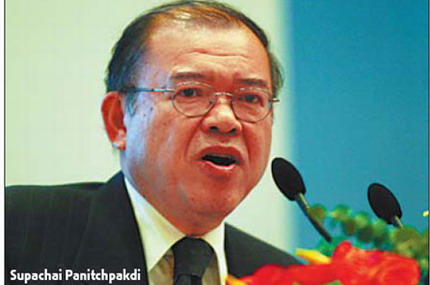|
|

|
UNCTAD chief calls for Asian monetary fundBy Wang Xu (China Daily)
Updated: 2009-07-04 11:49 Asia should have its own monetary fund to better ensure financial stability of the region, a senior UN official said. "Ultimately Asia should have its own monetary fund," Supachai Panitchpakdi, secretary-general of the United Nations Conference on Trade and Development (UNCTAD), said on Friday at the Global Think Tank Summit in Beijing.
 Supachai said it is necessary to further strengthen bilateral and multilateral economic cooperation in the region and a monetary fund for the Asia could better help cushion the impact of economic downturns for Asian nations. China, Japan, South Korea and 10 ASEAN nations agreed to set up a $120 billion pool of foreign exchange reserves this May, which could be used to defend their currencies to battle fallout from the global financial crisis. The pool is the latest development of the Chiang Mai initiative, a bilateral currency swap arrangement established in 2000 to help countries tackle a possible foreign capital flow shortage. Analysts say the reserve pool is a potential alterative to the International Monetary Fund for member nations, some of which vehemently complained about the IMF's stringent bailout requirements. "It is necessary to speed up the further expansion of the Chiang Mai Initiative and establish regional foreign exchange reserves," Zeng Peiyan, China's former vice-premier, said at the summit. "Such a move could enhance the region's ability to fend off financial risks. "
Henning said the move could supplement the resources of the IMF and streamline the process of negotiating parallel lines of defense in a financial rescue. China has been actively promoting regional economic cooperation over the years. It agreed to contribute 32 percent of the capital for the reserves pool, the same with Japan. South Korea would provide 16 percent, while the rest would come from the 10-member ASEAN. The nation's central bank also signed 650 billion yuan bilateral currency swap deal with countries such as Malaysia, and Argentina, since December. Supachai, an economist-turned politician, was Thailand's deputy prime minister and commerce minister during the Asian financial crisis in the late 1990s. He was elected director-general of the World Trade Organization in September 1999 and was appointed UNCTAD head in 2005.
The first Global Think Tank Summit will be held in Beijing from July 2-4, where close to 100 top-notch think tanks from home and abroad will be represented, including the Brookings Institution.
Main Forum
 International Financial and Economic Crisis and Global Economic Outlook International Financial and Economic Crisis and Global Economic OutlookSub-Forums
 I: Promoting Trade Liberalization and Investment Facilitation I: Promoting Trade Liberalization and Investment Facilitation II: Sustainable Development and Macro-economic Policies II: Sustainable Development and Macro-economic Policies III: Cooperation and Responsibilities of Multinationals during the Financial and Economic Crisis III: Cooperation and Responsibilities of Multinationals during the Financial and Economic Crisis IV: Global Consumption, Savings and Financial Security IV: Global Consumption, Savings and Financial Security V: Idea Exchange with Global Think Tanks on Key Economic Issues V: Idea Exchange with Global Think Tanks on Key Economic IssuesAgenda
 Afternoon of July 2 - Opening Ceremony Afternoon of July 2 - Opening Ceremony July 3 - Main Forum July 3 - Main Forum July 4 - Parallel Sub-Forums July 4 - Parallel Sub-Forums |